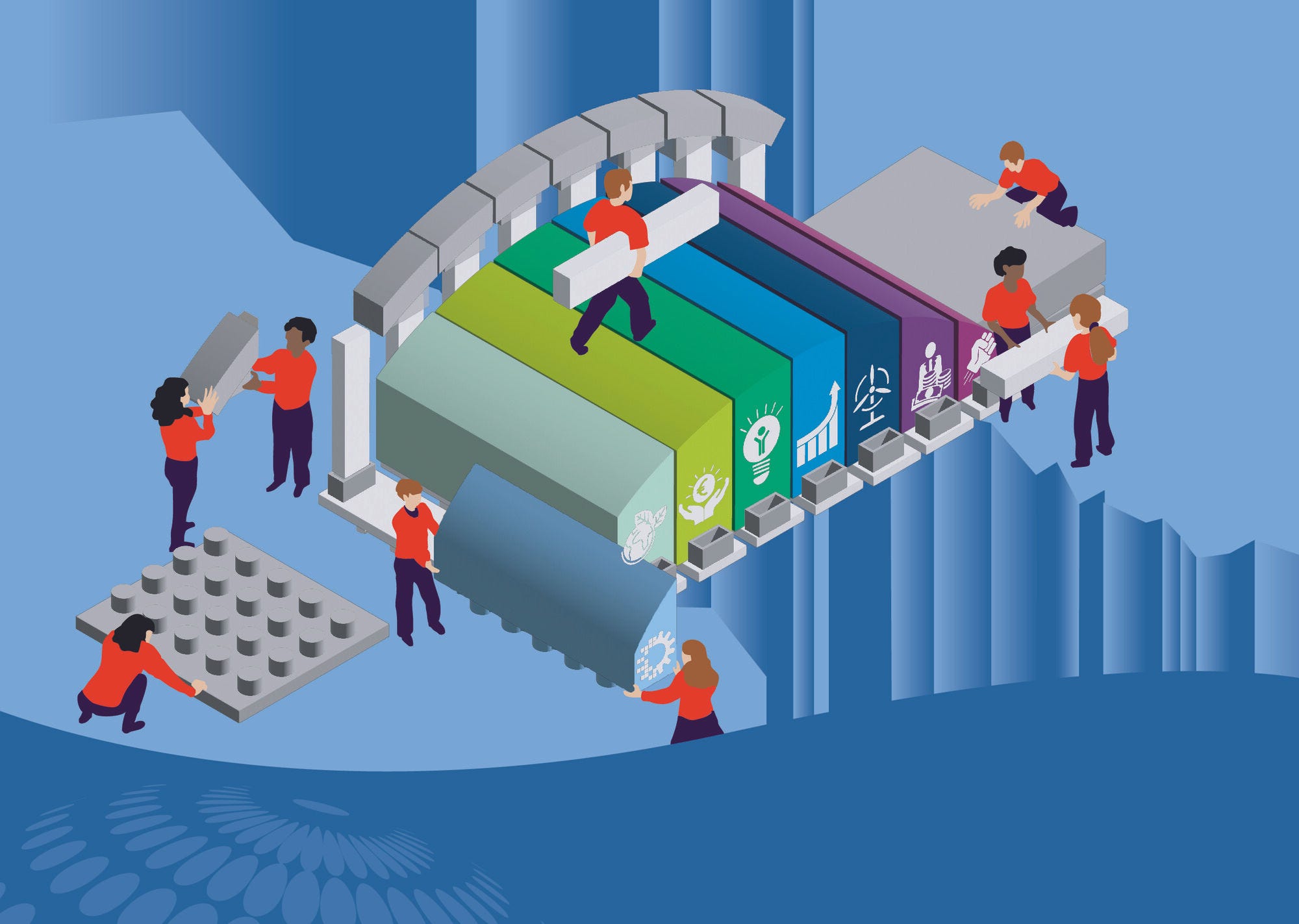Brazil's public governance efforts have been seen as a model for other Latin American countries in areas such as civil service reform, open and digital government. However, in line with regional trends, trust in government and public institutions in Brazil has consistently declined in recent decades, hindering inclusive and sustainable growth, as well as social cohesion. The COVID-19 and other emerging crises have further exacerbated this trend and highlighted the need to strengthen the resilience of public institutions. Brazil is the first country in Latin America to undertake an OECD study on the main drivers of trust in public institutions, as part of a broader effort in building trustworthy relationships between the people and institutions. This report provides novel evidence on Brazilian people’s expectations and evaluation of government’s reliability, responsiveness, openness, integrity and fairness, based on the OECD Trust Survey. Based on this evidence, it identifies opportunities to further enhance trust, including improving the delivery and responsiveness of public services, enhancing foresight, planning, and preparedness to address long-term challenges, and promoting communication and engagement between the government and the people.
Drivers of Trust in Public Institutions in Brazil

Abstract
Executive Summary
Trust is an important indicator to measure how people perceive the quality of, and associate with, government institutions in democratic countries. Governments can strengthen trust through having reliable institutions which are responsive to people’s needs and expectations, as well as political processes and public policies that follow the principles of openness, integrity, and fairness. In turn, trust leads to greater compliance with policies, nurtures political participation, strengthens social cohesion and builds institutional legitimacy.
In line with trends throughout Latin America, trust in government and public institutions in Brazil has consistently declined in recent decades (Latinobarometer 1995-2020, Gallup World Poll), hindering inclusive and sustainable growth and social cohesion (see Chapter 1 of this report). The COVID-19 crisis exacerbated this trend.
According to the OECD Trust Survey carried out online in Brazil in April 2022 as part of this study, only one quarter of Brazilian people (25.9%) reported high or moderately high levels of trust in their federal government, a larger share than those who reported high or moderately high trust in local government (19.6%) and the civil service (23.6%). Similar to results observed in other countries, Congress (14%) and political parties (7.6%) were the least trusted among the institutions considered. Vulnerable groups ‒ the poor, the young, people with lower levels of education, and those with economic or security concerns ‒ have the lowest trust in public institutions and feel most strongly that the political system does not work for all.
Drivers of trust in Brazil also vary according to the institution and level of government considered (see Chapter 2), suggesting the need to adopt different strategies in different areas to correctly target policies and reforms to build confidence. For example, the most important drivers of trust in the federal government in Brazil are perceptions of the government’s ability to address long-term challenges such as climate change, and fairness in providing services. Levels of trust in local governments are most influenced by whether people feel they have a say in community decisions and their satisfaction with administrative services. Finally, trust in the civil service is predominantly influenced by perceptions that civil servants treat everybody fairly and that people’s inputs in public deliberations are reflected in policymaking.
In a global context marked by multiple crises and complexity in recent years, Brazil will need a better understanding of what drives trust in public institutions if it is to effectively respond to current and future governance challenges. Setting public trust as an explicit policy objective will be key, especially to overcome policy implementation gaps and high levels of institutional fragmentation, while preserving Brazil’s hard-fought achievements on a number of public governance practices. Shifting from control-based to trust-based relations among civil servants, elected officials and public institutions would also help people feel trusted by institutions, leading to constructive interactions and reductions in negative perceptions and improving political attitudes. This is not an easy task but could act as a tipping point towards meaningful change in the country.
By carrying out this study Brazil becomes the first country in the Latin America and the Caribbean region to reflect in an in-depth analysis based on evidence and people’s feedback, how to set trust as a policy objective and place public trust on the public sector’s improvement agenda, investing in different initiatives to build trustworthy relationships between people and institutions. This report contributes to these efforts, providing a thorough analysis of the main drivers of trust in government in Brazil and identifying opportunities to strengthen it.
The opportunities identified in this report can be grouped into six areas: 1) improving the delivery and responsiveness of public services; 2) enhancing foresight, planning and preparedness to address long-term challenges; 3) enhancing communication and engagement between government and population; 4) strengthening public integrity and reducing perceptions of corruption; 5) promoting fairness across public institutions; and 6) improving the measurement of trust in public institutions and its drivers to build a robust evidence base. The table below summarises the main findings and areas of opportunity of this report.
|
Main findings |
Areas of opportunity |
|---|---|
|
Improving the delivery and responsiveness of public services (Chapter 3) |
|
|
Satisfaction with public services is comparatively low in Brazil and unequal among population groups. For instance, in April 2022, 30% of Brazilian respondents were satisfied with the education system and 32% with administrative services, compared with 58% and 63%, respectively, in 22 surveyed OECD countries. Satisfaction with services is a key driver for trust in local government in Brazil, and levels of trust in local government (20%) are lower than trust in the civil service (24%) or the federal government (26%). |
Increasing targeted communication and awareness-raising campaigns to inform citizens of their rights and how to access public services directly. Revisiting the allocation of responsibilities and co-ordination mechanisms among levels of government to deliver public services and ensuring resources are commensurate with the levels of responsibility allocated. |
|
People’s perception of government responsiveness is a challenge for Brazil, as for many OECD countries. Most people are sceptical about institutions adapting policies and services based on their feedback. Only 36% of Brazilian respondents believe that services would improve if people complained and 32% believe that policies would be adapted. |
Systematising user-centred design of public services through guidance and support from the centre, and pilot user-centred initiatives targeting high-impact life events. Continue strengthening feedback loops by ensuring satisfaction indicators are analysed in conjunction with performance indicators and by improving data integration to ensure the government has a holistic view of its users’ needs. Ensuring that vulnerable population groups have the opportunity to provide feedback to the government and that their feedback is properly analysed. |
|
Innovation is not seen as widespread in the public sector - only 28% of Brazilian respondents believe the public administration would implement innovative ideas to improve public services. Perceptions of the civil service’s capacity to innovate is an important driver of trust in local government in Brazil. |
Promoting a widespread “culture of innovation” across the public service and enhancing training in public sector innovation. |
|
Enhancing foresight, planning and Brazil’s preparedness to address long-term challenges (Chapter 3) |
|
|
In April 2022, only 23% of the Brazilian population expected the government to be prepared to tackle a new pandemic. There is room to enhance crisis management, risk management and emergency preparedness as important factors behind people’s trust in public institutions. |
Reviewing and adjusting mechanisms for dealing with risks to better manage unexpected and new types of crises. The revision could seek to guarantee flexibility at the local level combined with the capacity to co-ordinate among different sectors and to integrate new stakeholders in order to cope with all foreseeable and unforeseeable hazards. It could also enhance emergency planning by reviewing the warning system and implementing modernised crisis communication tools. Improving planning capacity by formalising and strengthening the role of the centre of government, streamlining national priorities and incorporating new tools into future-oriented exercises across the administration. Building a robust and transparent strategic foresight framework for the identification of problems through better use of evidence and stakeholder engagement |
|
Only slightly more than one quarter (27%) of Brazilians expected their data to be exclusively used for legitimate purposes if shared with government, below both the OECD average and values for Mexico (45%) and Colombia (34%). Brazil has however made strides to regulate the personal data processing by private or public entities to ensure the privacy of data subjects. |
Enhancing security and investing in privacy-preserving technologies, coupled with robust ethical standards and regulations. Clarifying the scope of responsibilities and criteria for data sharing and strengthening interoperability across government agencies. |
|
About one quarter of the population expect business and regulatory conditions to remain stable, although over half of the population are willing to formally register any new business. |
Reducing the regulatory burden imposed on firms by simplifying license requirements and rolling out one-stop shops for setting up new firms. |
|
As of April 2022, when the OECD Trust Survey was implemented, the perceived ability to mitigate climate change was the single most important driver of trust in government. However, only 40% of Brazilian respondents were confident that the government would reduce greenhouse emissions in ten years’ time. |
Building trust by encouraging green behaviour and informing citizens about how climate policies work and whom they affect, as well as promoting their involvement in the decision-making process. |
|
Enhancing communication and engagement between government and population (Chapter 4) |
|
|
Brazil has long been a regional leader in mainstreaming transparency, yet only one-third of respondents (35%) – less than in other LAC countries-- believe that information about administrative procedures would be easily available, which is a significant driver of trust in the civil service. |
Adopting a comprehensive approach to transparency, by proactively communicating the relevant information and data to people and providing guidance on how to access public information. Developing initiatives to strengthen inclusive communication. |
|
Voter turnout in Brazil is high (around 80% for national elections), and federal and subnational governments have established innovative tools to promote political participation. However, when asked in April 2022, most Brazilian respondents were sceptical about whether they could have an effective political voice and meaningful engagement. Only one in three believe they could influence community decisions and only one in five believe the government would adopt ideas provided in public consultations, both important drivers of trust in public institutions. |
Developing and strengthening participatory initiatives that incentivise and support political engagement, in particular reaching out to the most vulnerable groups and ensuring their representation in participatory engagement. Enhancing feedback and communication with people about how their views are considered in policymaking, potentially offering considerable improvement in trust levels. |
|
The Trust Survey carried out in April 2022 finds that one-third (35%) of people in Brazil are confident in their ability to participate in politics, similar to the OECD average, and 61% believe initiatives for collective action in their community would succeed. Yet, political parties, the institution that ensures people’s interests are represented in decision-making, are the least trusted institutions. |
Improving people's attitudes about their ability to participate proactively in politics by sharing more information about political processes and opportunities to influence policies. Reinforcing political participation through measures such as participatory programmes in schools and strengthening political parties, for example by democratising candidate selection procedures or decision making. |
|
Strengthening public integrity and reducing perceptions of corruption (Chapter 4) |
|
|
Perceptions of public integrity in Brazil are lower than perceptions of responsiveness, reliability, fairness, and openness. Most Brazilian respondents (60%) believe that public employees would accept a bribe for speeding up access to services, similar to the share in other Latin American countries. |
Investing in providing integrity guidance for civil servants and training to support ethical leadership. Strengthening co-ordination across agencies and levels of government to mainstream integrity policies. Continuing to develop a whistle-blower regulation to lay the foundations for a regulatory framework. |
|
Promoting fairness across public institutions (Chapter 4) |
|
|
Over a long period, Brazil succeeded in decreasing income inequality. Nevertheless, when consulted in April 2022, Brazilians reported high perceptions of unequal treatment and inequalities. According to the OECD Trust Survey, few people (19%) believe their application for government benefits would be treated fairly and the perception of fair treatment of applications is a significant driver of trust in government. |
Increasing efforts to tackle structural inequalities and ensuring fair social and economic treatment of all population groups in political processes and in the interaction with public officials, for example by providing inclusiveness training to public officials and publishing data and results on population subgroups for an open debate. |
|
Most people in Brazil are sceptical that public employees would treat all people equally, regardless of their economic status (62%) and their gender, ethnicity or sexual orientation (52%). At the same time, perceptions of fair treatment regardless of economic or demographic status are the most important drivers of trust in the civil service. |
Investing in building a more diverse public workforce, aiming at greater representation of underrepresented groups. Extending this opportunity to all levels of government that are beyond the reach of federal agencies would be beneficial |
|
Upgrading the measurement of trust to build a robust evidence-base (Chapter 2) |
|
|
The OECD Trust Survey finds that perceptions of reliability, fairness and openness are significant drivers of people trust in the federal government, civil service and local governments. |
Regularly collecting data on the drivers of trust to monitor the evolution of trust, and to identify where to invest to preserve and strengthen trust in public institutions. |
|
People with lower incomes, and lower levels of education, young people, and those with security concerns have consistently lower levels of trust in institutions. |
Ensuring that survey samples are representative of the diversity of the population, by combining socio-economic characteristics. This would allow systematic analysis of the differences within and across population groups. |
In the same series
Related publications
-
 21 November 2024
21 November 2024 -
 Policy paper19 November 2024
Policy paper19 November 2024











